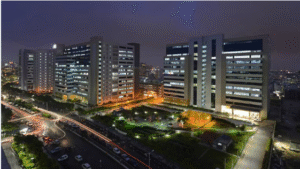Why Hyderabad Rising Hub for GCC 2025!
Hyderabad has emerged as a leading hub for Global Capability Centers (GCCs) in India, often referred to as Global In-House Centers (GICs) or Captive Centers. These centers are offshore units of multinational corporations (MNCs) designed to deliver high-value services such as IT, research and development (R&D), data analytics, artificial intelligence (AI), and business process management (BPM). Hyderabad’s rise as a GCC powerhouse is driven by its robust infrastructure, vast talent pool, cost-effectiveness, and supportive government policies. Below is a comprehensive overview of GCCs in Hyderabad, including key statistics, sectors, major players, advantages, challenges, and future outlook, presented below.

Latest Go Pro HERO13 Camera 2025
Overview of GCCs in Hyderabad:
- Number of GCCs: Hyderabad hosts approximately 355 GCCs as of 2024, making it the second-largest GCC hub in India after Bengaluru (875 GCCs).
- Workforce: Employs over 250,000 professionals, contributing significantly to the city’s economy.
- Market Contribution: Hyderabad’s GCCs account for 14% of TeamLease Digital’s GCC clients and contribute to India’s GCC market, valued at $64.6 billion in export revenue in 2024, projected to reach $105 billion by 2030.
- Sectors: Predominantly IT, Banking, Financial Services, and Insurance (BFSI), Pharmaceuticals, Biotechnology, High-Tech, and Engineering R&D (ER&D).
Why Hyderabad is a GCC Hub:
Hyderabad’s appeal as a GCC destination stems from a combination of strategic advantages:
Talent Pool:
- Skilled Workforce: Hyderabad produces a large number of STEM (Science, Technology, Engineering, Mathematics) graduates annually, with institutions like IIT Hyderabad, IIIT Hyderabad, Osmania University, and JNTU supplying high-quality talent.
- High-Tech Focus: The city leads in high-tech sectors, with 45% of its GCC workforce engaged in advanced technologies like AI, cloud computing, cybersecurity, blockchain, and data analytics.
- English Proficiency: A large English-speaking population facilitates seamless communication with global teams.
Infrastructure:
- Tech Parks and Connectivity: Hyderabad offers world-class IT parks like HITEC City, Gachibowli, Financial District, and Mindspace IT Park, with robust connectivity via metro, roads, and international airports.
- Real Estate: Lower office rentals compared to Bengaluru and Mumbai, with Grade A office spaces and institutional landlords ensuring quality infrastructure.
- Digital Infrastructure: Advanced IT infrastructure supports seamless global operations, including high-speed internet and data centers.
Cost-Effectiveness:
- Operational Costs: Lower salaries, real estate costs, and favorable exchange rates make Hyderabad 30–50% cheaper than Western markets like the US or UK.
- Scalability: Flexible and scalable operating models allow GCCs to adapt to market dynamics.
Government Support:
- Incentives: The Telangana government offers tax benefits, SEZ (Special Economic Zone) advantages, and ease of doing business through policies like TS-iPASS (Telangana State Industrial Project Approval and Self-Certification System).
- Skill Development: Initiatives like Young India Skill University (YISU) enhance the BFSI talent pool, aligning with global needs.
- Business-Friendly Environment: Proactive policies and collaborations with MNCs, as seen in meetings with companies like SEI and Vanguard, promote Hyderabad as a strategic hub.
Innovation Ecosystem:
- Startup and Service Provider Synergy: Hyderabad hosts 270+ service providers and 940+ startups, including unicorns like Zaggle and Darwinbox, fostering a collaborative environment.
- R&D Focus: Companies like Microsoft, Google, and Apple have established major R&D centers, making Hyderabad a hub for cutting-edge innovation.
Information Technology (IT) and High-Tech:
- Focus Areas: Software development, cloud computing, AI/ML, cybersecurity, data analytics.
- Major Players:
- Microsoft India Development Center (IDC): Established in 1998, it’s one of Microsoft’s largest R&D centers outside the US, working on Windows, Office Suite, and Azure. Employs thousands in Hyderabad.
- Amazon India Development Center: Focuses on AWS, AI, and e-commerce solutions, supporting global operations.
- Google: Operates a large campus in Hyderabad for product development and research
- Apple: Runs a critical development center for Apple Maps and other technologies.
- Workforce Contribution: High-tech accounts for 45% of Hyderabad’s GCC workforce.

Advantages of Setting Up GCCs in Hyderabad:
- Cost Efficiency: Operating costs are significantly lower than in Western markets, with savings of 30–50% due to lower salaries and real estate costs.
- Talent Availability: Access to millions of graduates annually, particularly in STEM and finance, with institutions like IIIT Hyderabad producing specialized talent.
- Innovation Hubs: Hyderabad’s focus on AI, cloud, and blockchain positions it as a leader in high-tech innovation.
- Infrastructure: Modern IT parks, reliable connectivity, and proximity to an international airport enhance operational efficiency.
- Government Support: Telangana’s policies, such as TS-iPASS and SEZ incentives, simplify company registration and operations.
- Scalability: Flexible models allow GCCs to scale operations rapidly, supported by a mature ecosystem of service providers and startups.
- Global Integration: English proficiency and cultural affinity with Western markets ensure seamless collaboration with global teams.
Steps to Set Up a GCC in Hyderabad:
Based on industry insights, the process to establish a GCC in Hyderabad includes
- Feasibility Study: Evaluate market demand, talent availability, costs, and regulatory requirements.
- Location Selection: Choose micro-markets like HITEC City or Financial District for robust infrastructure.
- Business Case Development: Create a comprehensive case highlighting ROI, strategic value, and cost benefits.
- Company Registration: Register as a private limited company, branch office, or subsidiary under Indian laws.
- Talent Strategy: Recruit skilled professionals, provide training, and foster a culture of continuous learning.
- Infrastructure Setup: Secure office space in IT parks, ensure IT connectivity, and comply with SEZ regulations.
- Governance and Compliance: Implement KPIs, data security measures, and governance frameworks.
- Operational Roadmap: Develop a GCC playbook with action plans, timelines, and success metrics.

Recent Developments and Investments:
- Eli Lilly (2025): Opening a second GCC in Hyderabad, hiring 1,000–1,500 for AI and automation roles.
- Sanofi (2024): Investing $437 million to expand its Hyderabad GCC, increasing workforce to 2,600 by 2026.
- SEI (2024): In discussions to set up a GCC, creating high-skill BFSI jobs.
- MetLife (2023): Announced a GCC with over 2,000 jobs, operational in 2024.
- Vanguard (2025): Opening a GCC with 2,300 AI and data-focused roles.
- GCC Summit 2025: The Nasscom GCC Summit (April 22–23, 2025, HICC, Hyderabad) will focus on “Ambition, Agility, Ascent,” highlighting Hyderabad’s role in AI-driven innovation and talent strategies.
- Economic Times GCC Summit (February 13, 2025): Discusses Hyderabad’s role in inter-GCC collaboration, data privacy, and GenAI adoption.
Future Outlook:
- Market Growth: Hyderabad’s GCC market is expected to grow as part of India’s projected $105 billion GCC market by 2030, with the number of GCCs reaching 2,200 nationwide.
- Emerging Technologies: Increased adoption of AI, ML, IoT, blockchain, and automation will drive GCC functions.
- Tier-2 Expansion: Nearby cities like Visakhapatnam and Warangal are emerging as GCC destinations due to lower costs and improving infrastructure.
- Policy Support: Telangana’s focus on BFSI, AI, and skill development (e.g., YISU) will attract more MNCs.
- Job Creation: Hyderabad’s GCCs are projected to employ 500,000+ professionals by 2030, driven by expansions and new setups.
Key Statistics:
- GCC Count: 355 (2024), second only to Bengaluru.
- Office Space: 28 million square feet dedicated to GCCs.
- Workforce: 250,000+ professionals, with 45% in high-tech roles.
- Export Revenue: Part of India’s $64.6 billion GCC revenue (2024), with a 40% YoY growth.
- Sectors: IT (45%), BFSI (20%), Pharma/Biotech (15%), ER&D (10%), others (10%).
Challenges and Opportunities:
- Opportunities:
- Leverage AI and GenAI for innovation, as seen in Microsoft and Amazon GCCs.
- Expand to Tier-2 cities for cost savings and untapped talent.
- Collaborate with startups and service providers for ecosystem growth.
- Challenges:
- Retain talent amidst competition with attractive compensation and work culture.
- Address rising real estate costs and urban congestion.
- Ensure compliance with data privacy laws like the DPDP Act.
Hyderabad’s 355+ GCCs, employing over 250,000 professionals, have positioned it as a global leader in high-tech, BFSI, and pharmaceutical innovation. With companies like Microsoft, Amazon, Google, Eli Lilly, and Sanofi driving R&D and digital transformation, the city’s robust talent pool, cost-effective operations, and supportive policies make it a top GCC destination. Despite challenges like talent retention and regulatory compliance, Hyderabad’s focus on AI, cloud, and skill development ensures sustained growth. By 2030, the city is poised to contribute significantly to India’s $105 billion GCC market, with expansions into Tier-2 cities and increased job creation.











Leave a Reply